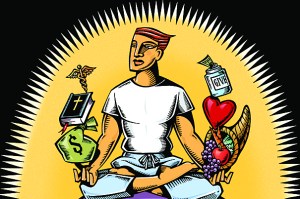Tag: Sleep
-
Health
Spotting speedy brain activity
Using ultra-fast MRI scans, scientists are able to track rapid oscillations in brain activity that previously would have gone undetected, a development that could open the door to understanding fast-occurring cognitive processes that once appeared off-limits to scientists.

-
Health
Keeping an eye on screen time
With parents and kids in back-to-school mode, refocusing on the daily demands of homework, sports, and activities, time spent staring at a screen comes at a premium. Steven Gortmaker, professor of the practice of health sociology at the Harvard T.H. Chan School of Public Health, has been studying how we have used and sometimes abused…
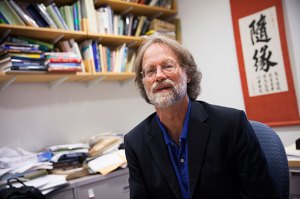
-
Health
Tracking the Sandman
Investigators at the Harvard-affiliated Massachusetts General Hospital have developed a system to accurately track the dynamic process of falling asleep, something that has not been possible with existing techniques.

-
Health
Research to lose sleep over
Will Clerx ’14 studied how going without sleep for long periods affects undergraduates.
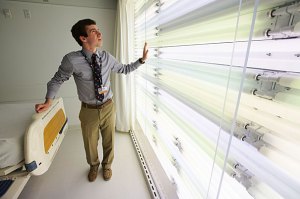
-
Health
TV a sleep detriment in children, study finds
A study following more than 1,800 children from ages 6 months to nearly 8 years old found a small but consistent association between increased television viewing and shorter sleep duration.

-
Health
Huffington’s awakening
Reformed workaholic Arianna Huffington talked about her new book, “Thrive: The Third Metric to Redefining Success and Creating a Life of Well-Being, Wisdom, and Wonder,” during a visit to HSPH.

-
Health
Multitasking against obesity
Specialists examines the country’s obesity problem from several angles at an HMS-MGH forum.

-
Arts & Culture
The power of dreams
Professor Kimberley C. Patton suggests dreams are “a language of enigmatic parable” that Western culture generally prefers to dismiss. “There’s a devaluation of dreams in the West,” said Patton, something the ancients would have found incomprehensible.

-
Health
Probing sleep’s drowsy mystery
Harvard researchers have worked for years to understand better the familiar mystery of sleep, highlighting not only what happens when we close our eyes, but also the effects on us when we don’t.
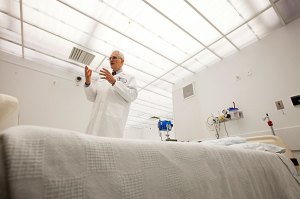
-
Health
What wakes me
Clifford Saper, chair of neurology at Harvard Medical School, and colleagues at Beth Israel Deaconess Medical Center recently discovered a brainstem area that senses oxygen dips and drives waking.

-
Health
Giving phobias a rest
A Harvard-led research team has found that exposure therapy for irrational fear of spiders seems to be more effective if it is followed by sleep, according to a recent study in the Journal of Psychiatric Research.
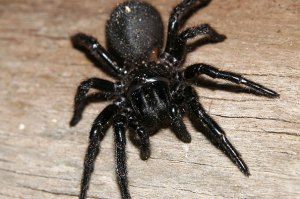
-
Health
Bleary America needs some shut-eye
Cranky, sleep-deprived America got some advice from experts at a Harvard School of Public Health Forum: Get some rest, and reap the health and productivity benefits shown in numerous scientific studies.
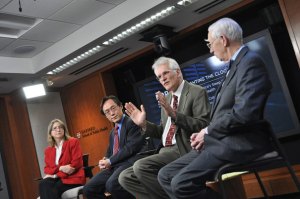
-
Health
A winter wellness workout
Dozens of Harvard undergraduates started the year with a new emphasis on wellness, thanks to the Optimal Health program. With presentations from a lifestyle medicine consultant, a nutritionist, a personal trainer, a sleep specialist, and a stress manager, Optimal Health emphasized prevention and fitness.
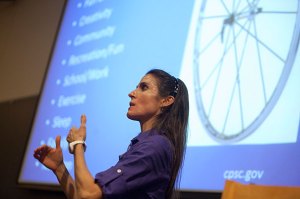
-
Campus & Community
Scientists Unravel Secrets of Sound Sleep
Researchers at Harvard Medical School (HMS) find that people’s brain rhythms during sleep may hold the answer to sleeping through loud noise.
-
Campus & Community
Catching up on lost sleep a dangerous illusion
People who are chronically sleep-deprived may think they’re caught up after a 10-hour night of sleep, but new research shows that although they’re near-normal when they awake, their ability to function deteriorates markedly as night falls…
-
Health
Chronic sleep loss degrades nighttime performance
Although the exact function of sleep remains unknown, sleep is clearly necessary for optimal cognitive performance, learning, and memory.
-
Health
Older adults found to fare better under sleep deprivation than younger adults
In a recent sleep study testing alertness and performance in sleep-deprived adults, researchers at Brigham and Women’s Hospital (BWH) determined that healthy older adults handle sleep deprivation better than younger…
-
Health
Obesity linked to dangerous sleep apnea in truck drivers
Truck crashes are a significant public health hazard, causing thousands of deaths and injuries each year, with driver fatigue and sleepiness being major causes. A new study by Harvard researchers…
-
Science & Tech
Researchers find potential cause of heart risks for shift workers
Harvard researchers at Brigham and Women’s Hospital (BWH) and colleagues have identified the potential cause of the increased risk for cardiovascular and metabolic disease in shift workers. The researchers found…
-
Health
Less sleep, more TV leads to fat toddlers
Infants and toddlers who sleep less than 12 hours a day are twice as likely to become overweight by age 3 than children who sleep longer. In addition, high levels of television viewing combined with less sleep elevate the risk, so that children who sleep less than 12 hours and who view two or more…
-
Health
Link between deep sleep and visual learning
A relationship has been observed between deep sleep and the ability of the brain to learn specific tasks. Researchers at Harvard-affiliated Brigham and Women’s Hospital (BWH) have now shown that the processes that regulates deep sleep may affect visual learning. These results are published in the March 12 issue of the Journal of Neuroscience.
-
Health
Selective attention most impaired during first night shift worked
Our biological propensity for keeping awake during the day and sleeping at night makes night work a challenge. Now, researchers at Brigham and Women’s Hospital (BWH) have found that attention is especially affected during the first night shift. This research appears in the Nov. 28 issue of the Public Library of Science One.
-
Health
Shift workers most impaired on first night shift following day shifts
Researchers at Harvard Medical School affiliate Brigham and Women’s Hospital (BWH) have found that the attention of shift workers is most impaired on the first night shift following a string…
-
Health
Sleep found to repair and reorganize the brain
Most of us do it every night but we don’t know why. If you miss too many nights, it might kill you. We know why we eat, drink, breathe, and move around, but no one can explain why we need to sleep. What does seven or eight hours of snoozing really do for us? Van…
-
Health
Study shows importance of sleep for optimal memory functioning
Harvard researchers have tracked fatigue’s footsteps on the human brain, showing that sleeplessness impairs the ability to learn new information and that abnormal brain function, not reduced alertness, is the cause.
-
Health
Sleeping your way to heart health
A new Harvard School of Public Health study indicates that there’s more than just olive oil and red wine keeping heart disease rates down in Mediterranean countries. There’s the naps, too.
-
Health
Interns continue to work overly long shifts, study finds
That intern working on you at the hospital may be so sleep-deprived his or her performance is no better than that of a drunk. That’s one conclusion of a national study by investigators at the Harvard Medical School.
-
Health
Melatonin most effective for sleep when taken for off-hour sleeping
Researchers from the Divisions of Sleep Medicine at Brigham and Women’s Hospital and Harvard Medical School have found in a double-blind placebo-controlled clinical study that melatonin, taken orally during non-typical…




